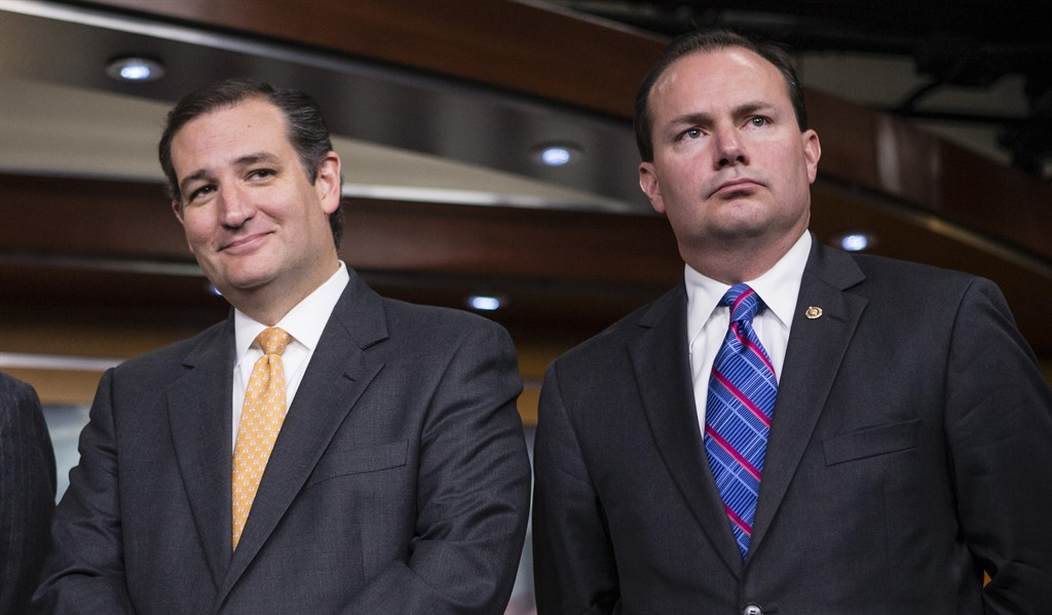Perhaps the healing power of Ted Cruz’ suggested compromise on ObamaCare repeal was a bit oversold. At first blush, the plan as laid out by Vox seemed like a simple enough idea — let insurers add non-compliant plans to the exchanges as long as they offered at least one compliant plan. Not only would that provide for innovation, but it would also encourage people who have largely stayed out of the insurance pools to get into at least the shallow end of them, and thereby helping to stabilize the overall markets.
If you thought it was too good to be true, well … you’re right. The Hill’s sources on Capitol Hill say the Cruz plan will be lucky to get 15 votes:
GOP aides say the proposal that Cruz and his allies are framing as the potential key to passing the stalled healthcare bill is a nonstarter with most Republicans in the upper chamber.
The proposal would allow insurance companies the freedom to sell any kinds of health plans they want as long as they also sell at least one plan that qualifies under the regulatory requirements of the Affordable Care Act (ACA).
“I would say that if we voted on the Cruz proposal, it would be in the neighborhood of 37 to 15 against, 37 no votes and 15 yeses, and that’s probably generous,” said a GOP aide familiar with the Senate negotiations.
“Nobody wants to go home and say to a 45-year-old steelworker with diabetes that you should have to pay a lot more for your health insurance,” the aide added.
Right now the CBO is scoring two plans, one of which includes the Cruz plan. The other includes more funding for market stabilization, and Cruz supporters argue that this will skew the results against the Cruz plan. There is some irony in that, they argue, since the alternate plan doesn’t potentially impact market stabilization in the same way as the Cruz compromise, so it actually needs less funding for market stabilization.
Experts in center-right policy groups agree. The split between ObamaCare-compliant and non-compliant plans would force older and less healthy into the former, they argue, which would create a massive increase in premiums. That would force the government to spend more on subsidies in order to cover the costs under the ObamaCare formula, and some of those increases will still be borne by the consumer — hence the concern about the 45-year-old steelworker with diabetes. Requiring all plans to comply equally with less-stringent requirements, even if on a state-by-state basis, spreads the risk more evenly and keeps selection bias from destabilizing markets. Unfortunately, it also tends to dampen innovation, at least in the short run, and that means no significant premium relief in the short run, either.
Conservative groups, on the other hand, want a return to first principles. Politico reports that they are leaning on Senate Republicans for a broader repeal rather than tweaks to the status quo:
Cruz and Lee’s Consumer Freedom Act would allow the sale of noncompliant healthcare plans as long as insurers offered plans that also covered pre-existing conditions and other terms mandated by the Affordable Care Act. Lee and Cruz, who were part of the Senate’s health care working group, have been pushing their colleagues privately to adopt the language, arguing they should at least allow consumers to buy cheap plans if they can’t repeal the law entirely.
“Congress should not stand in the way of allowing Americans who want to opt out of Obamacare to do so,” said Club for Growth President David McIntosh.
“If Senate Republicans insist on tweaking Obamacare, we urge them to adopt language being pushed by Sens. Cruz and Lee that will provide consumers with more choice and truly affordable health insurance coverage,” said FreedomWorks President Adam Brandon.
Rather than provide a bridge to an agreement, the Cruz proposal has perhaps defined the split in greater contrast. With time running out, it looks like the Senate Republican caucus is about to come apart on ObamaCare. The trenches are getting deeper, and there seems to be fewer formulations for compromise left to try.








Join the conversation as a VIP Member